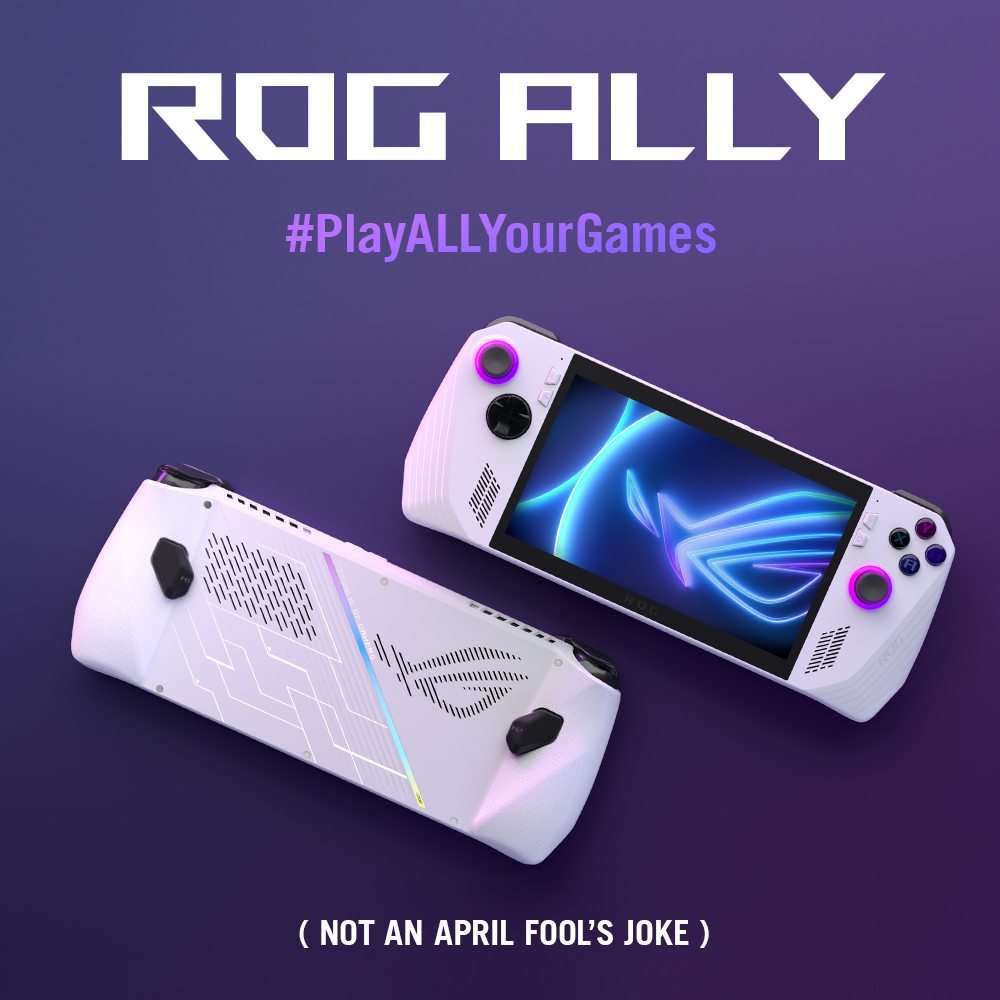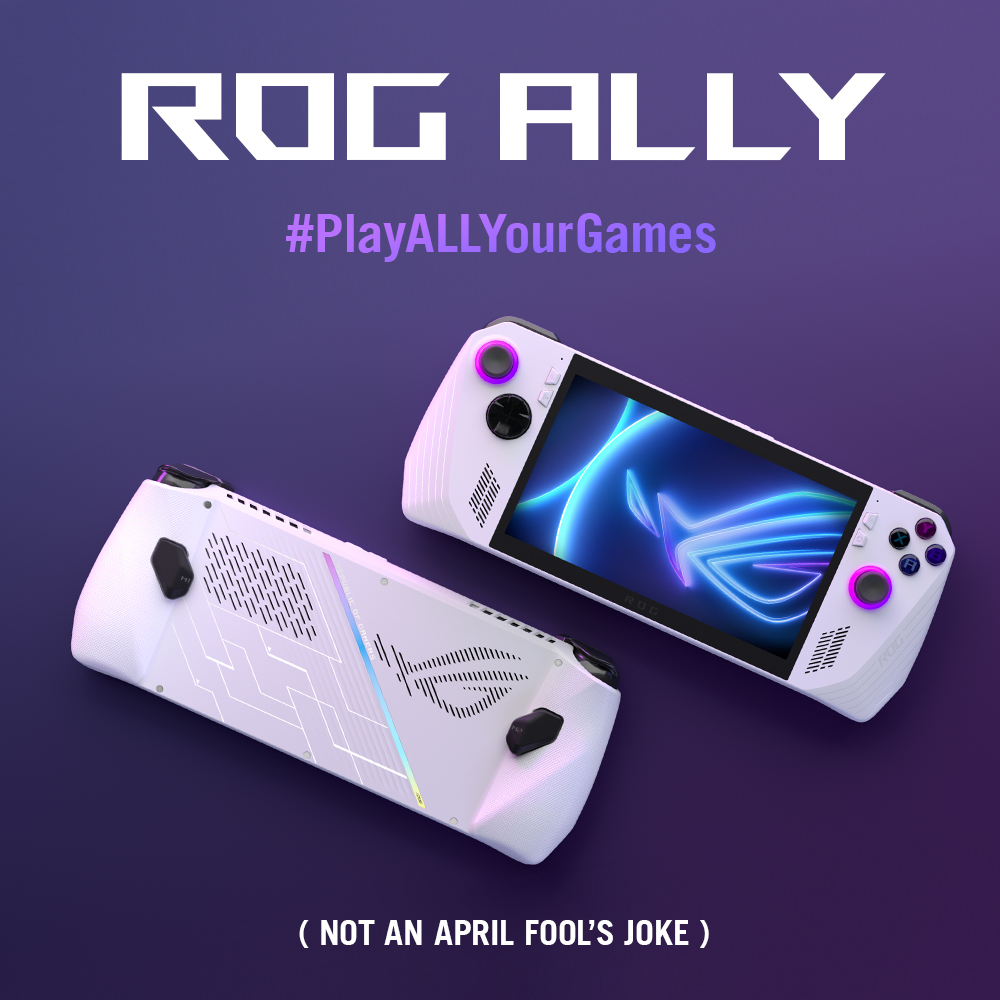ASUS confirms its handheld gaming PC
The ROG Ally was announced on April first. But, at the time, it was considered an April Fools joke. Two days later, Asus confirmed that it was indeed real. While the product has no confirmed release date, some YouTubers, most notably LTT and Dave2D, have already gotten their hands on some pre production models. The general consensus is that it is a lot better than Steam Deck, another handheld gaming device. It has a better screen, it is more powerful, etc. But the main thing that could make this a big success, is the price. The Steam Deck was not the most preformant handheld on the market. The most powerful handhelds mostly come from a Chinese company Ayaneo. While they do have some more affordable handhelds, none of them can compete with the Steam Deck’s price. The Steam Deck is $400, which makes it the best value handheld on the market. So, in order for the ROG Ally to truly succeed, they would need to be around that price range. Based on what ASUS has shown, it seems it would be successful. They are planning to release it globally, which shows that they are confident in the product since launching something globally comes with a huge price tag. Also, Bestbuy is going to carry it. One thing to note about BestBuy is that they would only carry a product if they are sure it would sell.

Nexx garage doors have massive vulnerabilities
A security researcher found a series of vulnerabilities with the Nexx brand of smart garage openers. He says that he could find and open garages from the internet. The reason that this is a bad thing is obvious, but Nexx doesn’t think so. The researcher who discovered the issue says that Nexx has not responded to their attempts to responsibly report the vulnerabilities for months. Sabtean made a video demonstrating the vulnerability. Not only did he remote open his own garage, he could see other devices that he could also remote into. Nexx won’t even respond to this issue when the Department of Homeland Security contacted them.
ChatGPT news
- Germany could follow in Italy’s footsteps by blocking Chat-GPT over data security concerns. The German commissioner for data protection told the Handelsblatt newspaper “In principle, such action is also possible in Germany,” Ulrich Kelber said, adding that this would however fall under state jurisdiction. However, he did not outline any plans to take such action. If Germany follows Italy in banning ChatGPT, hopefully Japan doesn’t join them or we are going to have a problem. In all seriousness, I would not be surprised if the EU would ban ChatGPT.
- Samsung is also banning ChatGPT since its fab workers leaked confidential information. Samsung now plans to develop its own ChatGPT-like AI for internal use only. So far, Samsung Semiconductor has recorded three instances of ChatGPT use which led to data leaks. While three may not seem like a lot, they all happened over the course of 20 days, so the situation is quite disturbing. One instance was an employee submitting source code to ChatGPT, which essentially disclosed the code of a top-secret application. With all of the source code that OpenAI is receiving, pretty soon they may start producing their own semiconductors.
- An Australian politician sues ChatGPT for defamation. Legal firm Gordon Legal is spearheading the case on behalf of Hepburn Shire Council Mayor, Brian Hood. Gordon Legal claims ChatGPT made several false statements when asked about Hood’s involvement in the scandal, including that Hood was accused of bribing officials in Malaysia, Indonesia and Vietnam between 1999 and 2005. It also reportedly said Hood was sentenced to 30 months in prison after pleading guilty to two counts of false accounting, and that he authorized payments to a Malaysian arms dealer.
VR is not catching on with teens
Virtual reality hasn’t caught on with American teens, according to a new survey from Piper Sandler. While 29% percent of teens polled owned a VR device, only 4% of headset owners used it daily, the investment firm found, and 14% used them weekly. Also, teenagers didn’t seem that interested in buying VR headsets in the future. Only 7% said they planned to purchase a headset, versus 52% of teens polled who were unsure or uninterested. Piper Sandler’s teen study surveyed more than 5,600 teens in the U.S. in February. I can understand why teens are not interested in VR. They already have smartphones and a VR headset to them might just be an underpowered smartphone that you can only wear on your face. This must be terrible news to Apple, since their upcoming headset could become their biggest flop in recent history.
TikTok fined £12.7m for misusing children’s data
It estimated TikTok allowed up to 1.4 million UK children aged under 13 to use the platform in 2020. The video-sharing site used the data of children of this age without parental consent, according to an investigation by the Information Commissioner’s Office. UK data protection law does not have a strict ban on children using the internet but requires organizations that use the personal data of children to obtain consent from their parents or carers. The UK government appears to value the information of a child to less than £10. I have said this enough, fines to corporations should be percentages, not straight fines. This would force companies to actually care about the regulations of the countries that they operate in.
Another company is sharing sensitive data
For years, online alcohol recovery startups Monument and Tempest were sharing with advertisers the personal information and health data of their patients without their consent. Monument CEO Mike Russell confirmed more than 100,000 patients are affected. The data shared with advertisers includes patient names, dates of birth, email and postal addresses, phone numbers and membership numbers associated with the companies and patients’ insurance provider. The data also included the person’s photo, unique digital ID, which services or plan the patient is using, appointment information and assessment and survey responses submitted by the patient, which includes detailed responses about a person’s alcohol consumption and used to determine their course of treatment. It was only last month when Cerebral reported that it was sharing customer data with advertisers.
Monster sues an indie developer for using the word “Monster”
Monster Energy’s lawyers have targeted Dark Deception: Monsters & Mortals developer Glowstick Entertainment, for using the word monster in its game. Monster is also suing for any use of “claw-like design”. Additionally, Monster’s filing would also prevent the studio from marketing its games “in the colors green or white, or whole or in part, regardless of the background behind the mark(s)”. The founder of Glowstick Entertainment, Vincent Livings, said in a tweet that he would be fighting Monster in court. The term for this sort of behavior is copyright trolling. Livings has also called for fans to boycott the energy drink company, and claimed: “If nothing else, I hope they will eventually learn that going after game studios is not in their best interest”. This is not the first time that Monster has done this. Back in 2020, Monster sued Ubisoft for their game Immortals Fenyx Rising, which was originally named Gods & Monsters. The fact that I have the word Monster in the title would make me eligible for them to sue. They will also try to take down the whole website because my logo has green in it.

